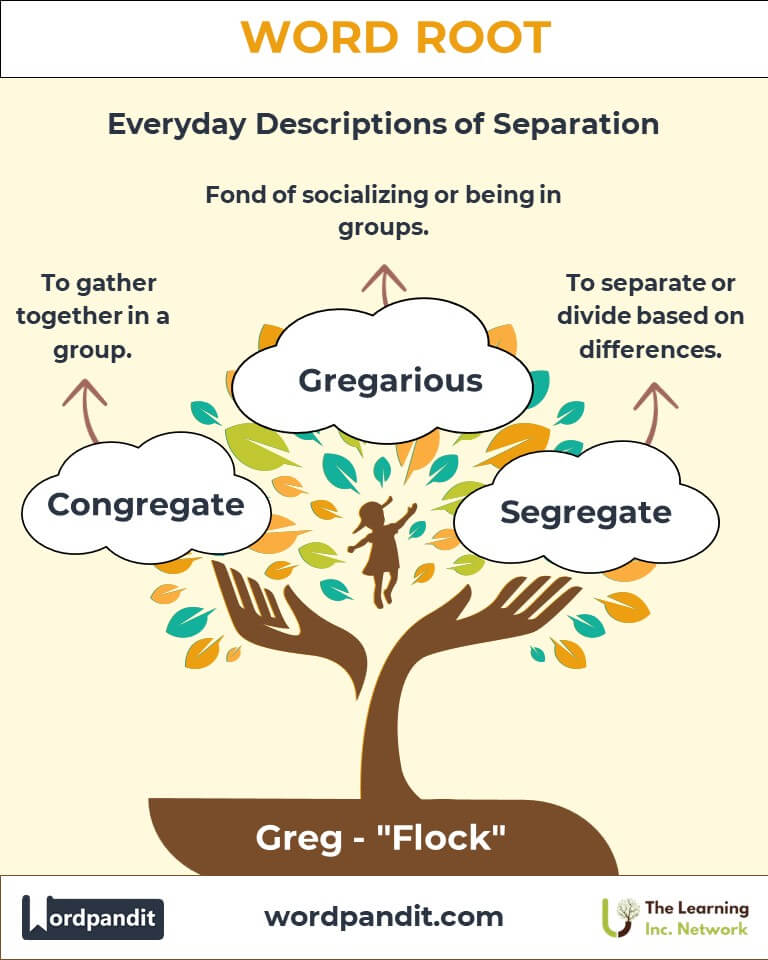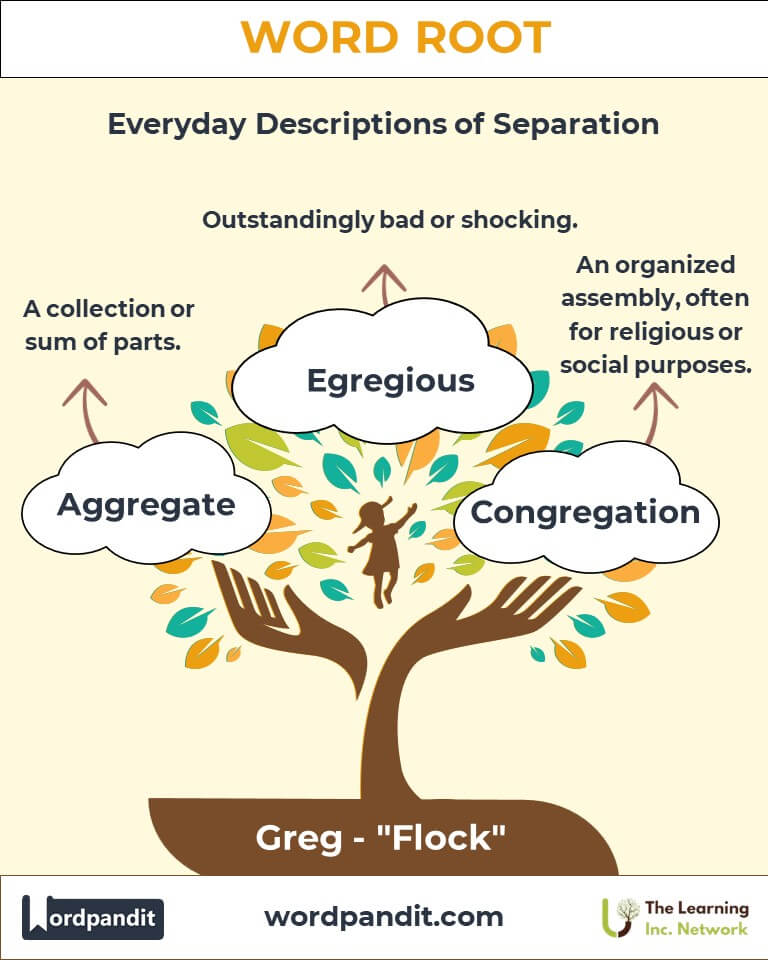Greg: The Root of Community and Connection
Discover the fascinating origins and versatile applications of the root "Greg," meaning "flock" or "group." From social behavior to specialized terminology, this root emphasizes unity and collective strength.
Table of Contents
- Introduction: The Essence of "Greg"
- Etymology and Historical Journey
- Mnemonic: Unlocking the Power of "Greg"
- Common Greg-Related Terms
- Greg Through Time
- Greg in Specialized Fields
- Illustrative Story: "Greg" in Action
- Cultural Significance of the Greg Root
- The Greg Family Tree
- FAQs About the agr Word Root
- Test Your Knowledge: agr Word Root Quiz
- Conclusion: The Living Legacy of Greg
Introduction: The Essence of "Greg"
The root "Greg" derives from the Latin word grex (pronounced "grecks"), meaning "flock" or "herd." This root finds its way into words that reflect social cohesion, collective action, and the dynamics of groups. Whether in everyday language or specialized fields, "Greg" reminds us of the importance of community and togetherness.

Etymology and Historical Journey
The word root "Greg" has its origins in the Latin grex, with early uses referring to groups of animals or people. Over time, it came to symbolize not only physical gatherings but also shared traits or collective behaviors. In medieval Europe, "Greg" words often described social classes or congregations, and as languages evolved, they expanded into philosophical, scientific, and sociological contexts.
Mnemonic: Unlocking the Power of "Greg"
To remember "Greg," visualize a shepherd guiding a flock of sheep, symbolizing unity and organization.
Mnemonic Device: “Greg gathers groups for greatness—whether people, ideas, or flocks!”
Common Greg-Related Terms
- Congregate (kon-grih-gate): To gather together.
Example: "The students congregated in the library to prepare for exams."
- Gregarious (grih-gair-ee-us): Fond of socializing or being in groups.
Example: "Her gregarious nature made her the life of every party."
- Segregate (seg-rih-gate): To separate or divide based on differences.
Example: "The policy sought to segregate waste into recyclable and non-recyclable categories."
- Aggregate (ag-rih-gate): A collection or sum of parts.
Example: "The aggregate score determined the winner of the competition."
- Egregious (ih-gree-jus): Outstandingly bad or shocking.
Example: "His egregious error cost the team the championship."
Greg Through Time
- Congregation (Middle Ages): Initially used for religious assemblies, this word evolved to represent any organized gathering.
Modern Shift: Now includes non-religious contexts like public meetings.
- Segregation (19th Century): Originally applied to spatial or social separations.
Impact: Gained prominence during civil rights movements as a term for racial division.
- Aggregation (Scientific Revolution): Described the collection of data or materials in disciplines like geology and economics.
Greg in Specialized Fields
- Sociology:
Congregate: Used to study social behaviors in crowds or communities.
Example: "Sociologists analyze how individuals congregate during protests."
- Biology:
Gregarious: Refers to animals that thrive in groups.
Example: "Gregarious species like elephants rely on social bonds for survival."
- Data Science:
Aggregate: Involves combining data for analysis.
Example: "The algorithm aggregated user preferences to improve recommendations."
- Law:
Segregate: Pertains to the separation of assets or liabilities.
Example: "The court ordered the company to segregate its finances."
Illustrative Story: "Greg" in Action
During a school project, a gregarious student named Mia organized her classmates to work together on a community garden. Initially, they congregated weekly to plan and gather materials. As tasks were divided, Mia ensured that no one felt segregated or left out. By the end of the semester, their aggregate efforts resulted in a thriving garden, teaching everyone the value of teamwork and inclusion.
Cultural Significance of the Greg Root
"Greg" holds profound cultural relevance, symbolizing both unity and division. Words like "congregate" celebrate human connections, while "segregate" reflects historical and ongoing struggles for equality. From ancient tribal gatherings to modern data aggregation, this root encapsulates the dual nature of groups: their ability to unify or separate.

The Greg Family Tree
- Con- (Latin: "together"):
- Congregate: To gather collectively.
- Se- (Latin: "apart"):
- Segregate: To set apart from the rest.
- E- (Latin: "out of"):
- Egregious: Originally meant “standing out from the flock” (positive), now denotes something exceptionally bad.
- Ad- (Latin: "toward"):
- Aggregate: To bring together into a group or whole.

FAQs About the "Greg" Word Root
Q: What does "Greg" mean?
A: The root "Greg" originates from the Latin word grex, meaning "flock" or "group." It represents ideas of collective behavior, unity, or shared identity. Words like "congregate" emphasize gathering together, while terms like "segregate" highlight division within a group.
Q: What is the difference between "aggregate" and "congregate"?
A:
- Aggregate: Refers to a collection of different parts brought together as a whole. For example, data scientists aggregate information from multiple sources to analyze trends.
- Congregate: Focuses on the act of gathering people or things into one place, such as congregating for a meeting or event.
Q: Why does "egregious" mean exceptionally bad?
A: "Egregious" originally meant "standing out from the flock" in a positive way, as it comes from the Latin ex (out of) and grex (flock). Over time, it evolved to mean "shockingly bad" because it often described behavior that stood out in a negative way, such as a blatant mistake or offense.
Q: How is "gregarious" used in biology?
A: In biology, "gregarious" describes species that prefer to live, move, or feed in groups. For example, many bird species, like starlings, are gregarious because they travel and roost together for protection and social bonding.
Q: What does "segregate" imply in social contexts?
A: "Segregate" means to separate based on specific differences, often used in contexts of race, religion, or social class. Historically, segregation was a policy of dividing people based on race, as seen in the Jim Crow laws in the U.S. It highlights division, while its counterpart, "integrate," emphasizes inclusion.
Q: Can "aggregate" apply to non-physical things?
A: Yes, "aggregate" is often used in abstract contexts, such as data, opinions, or statistics. For instance, "aggregate demand" in economics refers to the total demand for goods and services in an economy.
Q: Does "congregation" only refer to religious gatherings?
A: Originally used to describe church gatherings, "congregation" now applies to any assembly of people or animals. For example, a congregation of students might meet for a group project.
Test Your Knowledge: Greg Word Root Quiz
1. What does the root "Greg" signify?
2. Which word means "fond of socializing"?
3. What does "egregious" mean today?
4. How is "aggregate" used in data science?
5. Which word refers to "gathering together"?
Conclusion: The Living Legacy of Greg
The root "Greg" continues to influence language and culture, capturing the dynamics of unity and division. From flocking birds to complex data aggregation, its versatility spans disciplines and contexts. By exploring this root, we deepen our understanding of human connection and the power of groups, reminding us that whether we congregate or segregate, the essence of "Greg" shapes our world.















Hi, are there any words that seem as if they are driven from the word Greg; but they’re actually not
Thanks for sending these words on email